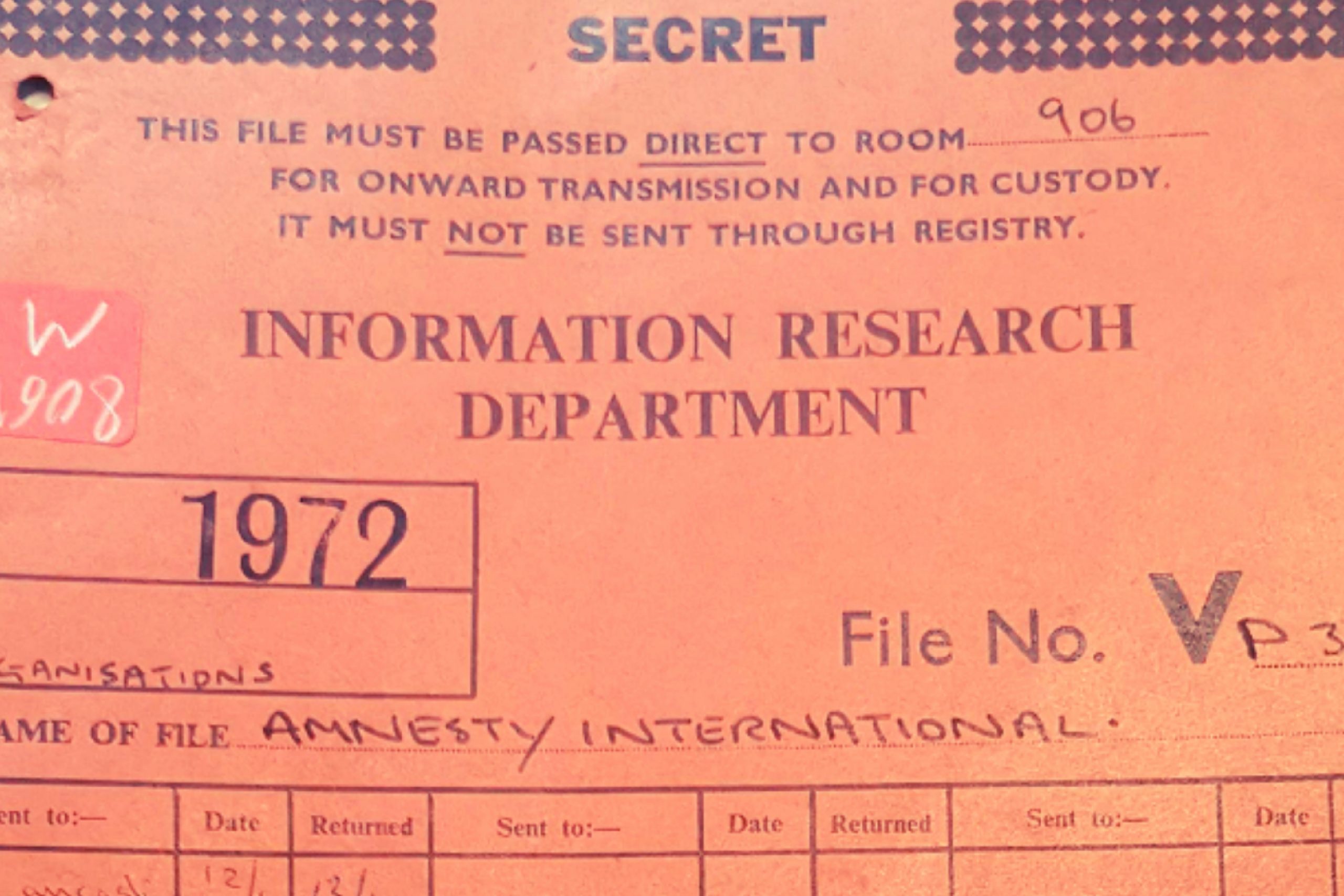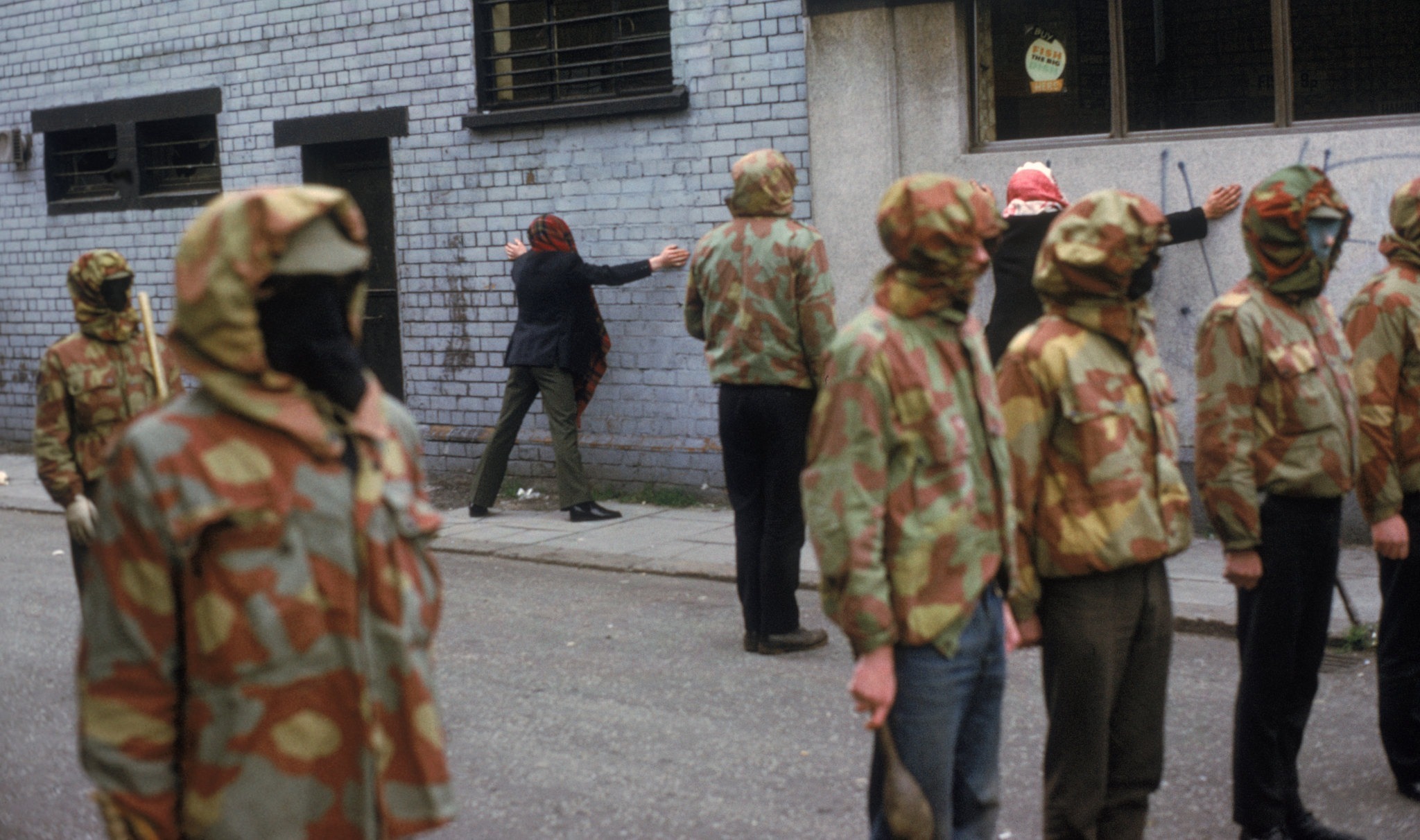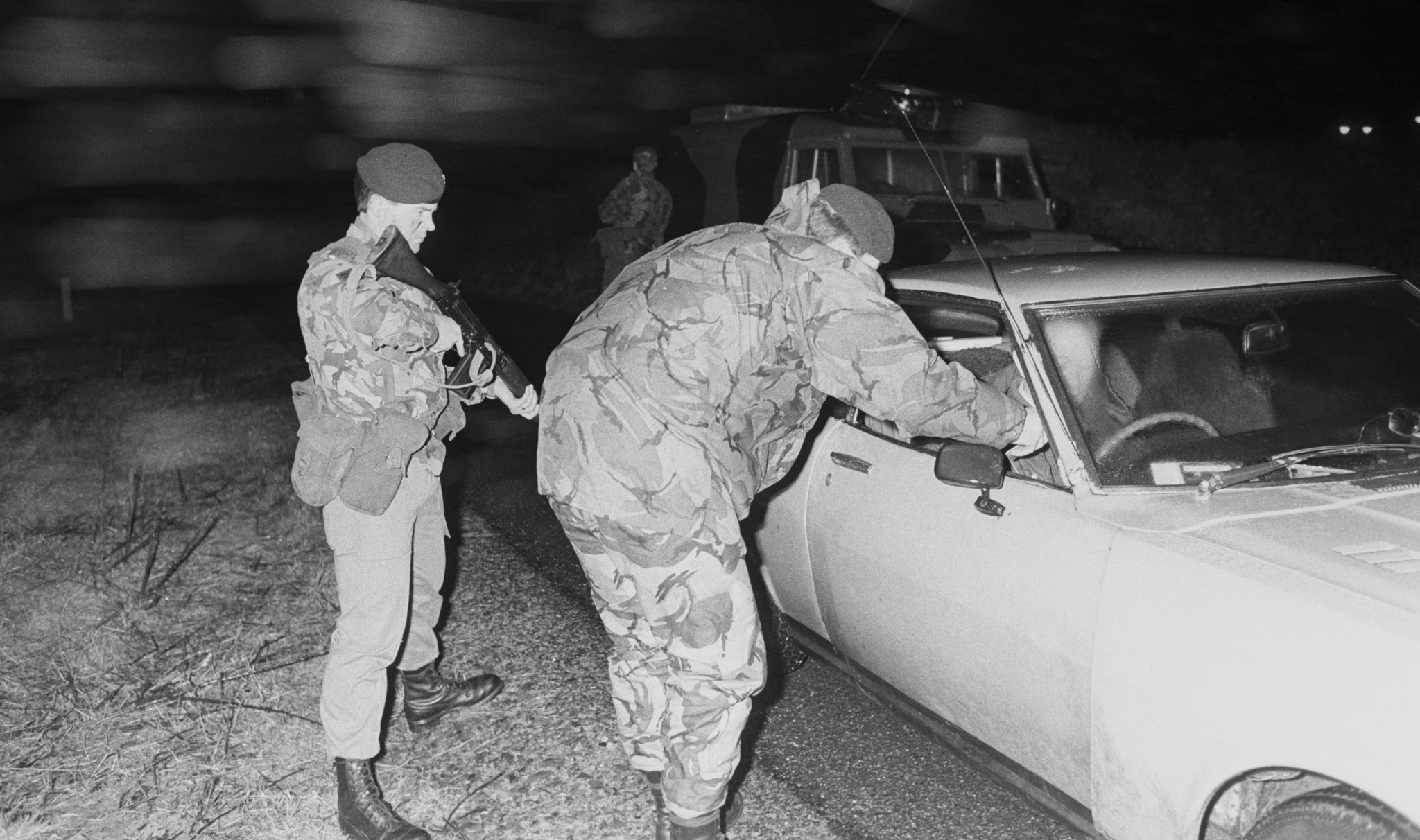In order to suppress an Amnesty International report on Britain’s use of torture in Northern Ireland, the Foreign Office plotted a secret propaganda campaign to discredit the report’s author.
Declassified after 50 years, a British file unveils a sinister plan to target a future Nobel Peace Prize recipient, and shows how UK officials marked civil society for covert information operations.
The ‘Five Techniques’
In August 1971, at the height of the Troubles in Northern Ireland, the unionist government in Stormont launched Operation Demetrius.
Signed off by British home secretary Reginald Maudling, the operation involved the mass arrest and internment (imprisonment without trial) of 342 people from Catholic and nationalist backgrounds. The intelligence used to make the arrests was seriously flawed; many of those arrested had no connection to the IRA.
Fourteen of those arrested were then subjected to the “five techniques” – hooding, sleep and food deprivation, white noise, and being spread-eagled in an intense “stress position”. If the men failed to maintain this “stress position”, they were introduced to a sixth technique – severe beatings.
The “interrogations” were carried out by Special Branch officers from the Northern Irish police, Royal Ulster Constabulary (RUC), and took place in a purpose-built unit at Ballykelly army barracks in County Derry.
Amnesty International
In December 1971, the Chairman of the Swedish branch of Amnesty International, Thomas Hammarberg, led a delegation to Belfast to investigate allegations of “brutal physical interrogation methods” combined with “sensory deprivation”.
During his visit, Hammarberg heard how internees had “been severely beaten during arrest and transport”. A number of the men “had bruises on their bodies, one of them was black and blue over his buttock and one thigh which our medical expert found consistent with his complaint about repeated, brutal beatings”.
Several of them had also been “forced to stand spread-eagled against a wall for many long hours, being hooded and thereby unprepared for the sudden beatings, forced to hear one hissing noise which drowned all other sounds, be deprived of food and water and prevented from sleeping”.
This treatment, wrote Hammarberg, “brought them to a mental breakdown”.
Targeting ‘a prize pain in the neck’
Hammarberg was convinced Britain was “not interested in any independent investigation” into its treatment of prisoners in Northern Ireland.
As he recalled, the British authorities had already “issued whitewash reports” on the subject, with prime minister Edward Heath privately calling Amnesty International a “disreputable organisation”.
Unknown to Hammarberg, the British government’s campaign to discredit Amnesty’s report went much further than that.
According to a file declassified after 50 years, the Foreign Office plotted a campaign against Amnesty to discredit Hammarberg in order to destroy trust in his delegation’s report.
On 21 December 1971, a Foreign Office official in the Republic of Ireland Department, R.B. Bone, expressed concern about Hammarberg’s visit. The letter was addressed to Thomas Barker, the head of the Information Research Department (IRD), a secret British propaganda outfit which at this time was expanding its activities in Northern Ireland.
Britain was “not interested in any independent investigation”.
As Bone wrote: “Hammarberg is a name well known to me from my days in Stockholm…. He was generally regarded by the Embassy as being a prize pain in the neck”.
Bone thus expected Hammarberg’s team to find that Britain had “indeed been guilty of cruelties, atrocities, etc” in Northern Ireland.
In order to deflect from Amnesty’s findings, Bone recommended that the IRD gather information on Hammarberg and distribute it covertly through the media.
“It might at this stage be useful”, Bone wrote, “if we were in a position to leak to the Press some details about Hammarberg’s personal history and anti-British prejudice”.
The British embassy in Stockholm could not produce much useful material. However, the day after Bone’s letter, Barker received a letter from another official, named as S.J. Truesdale, informing the IRD chief: “We have information on Hammarberg”.
The following lines are redacted, leaving it unclear what information was being prepared for leakage to the press.
‘I suggest it should be done’
On 30 December 1971, W.K.K. White, another British official in the Republic of Ireland Department, also wrote to Barker.
“The original cause of our concern was the confident assumption that Mr Hammarberg will lay on with a trowel his criticism of us”, White wrote. “He will do so under the still respectable (to many) guise of an Amnesty report. He will get international coverage for this”.
As such, White similarly advised that the IRD should “raise such doubts as we can about his motives, and the independence of his judgment”. He continued: “If anything could therefore appear at about this time to throw doubt upon the report, I suggest it should be done”.
In his letter, White added that the covert plan to discredit Hammarberg “might be a matter for discussion with Mr Maitland’s committee”, referring to Donald Maitland, the Chief Press Secretary for 10 Downing Street.
In his 2002 statement to the Bloody Sunday Inquiry, Maitland denied he was responsible for coordinating Whitehall activity “in both the overt and discreet information fields”.
This document, as well as previously declassified files relating to IRD activity in Northern Ireland, casts serious doubt on Maitland’s testimony.
The Foreign Office thus plotted a covert operation aimed at discrediting an independent investigation into Britain’s use of torture. This activity went beyond efforts to overtly and covertly “blacken the IRA”, with civil society forming a clear target.
And yet, it was acknowledged at the highest levels of government that torture in Northern Ireland was indeed “deliberate policy”.
Hammarberg would go on to receive a Nobel Peace Prize on behalf of Amnesty International.
“It is appalling that the UK government was attempting to undermine evidence of its use of torture.”
‘Damning files’
Gráinne Teggart is Campaigns Manager at Amnesty International UK and lead of Amnesty UK’s work on Northern Ireland conflict related cases. She told Declassified:
“These damning files reveal a shameful determination to keep human rights abuses hidden and an unscrupulous government prepared to use smear tactics as a cover-up. The UK government has a long, dark history of using propaganda to deflect from its human rights violations.
“Our mission in Northern Ireland in the 1970s led by our esteemed former colleague Thomas Hammarberg, was a watershed moment, and found the brutal use of torture by British state forces.
“Amnesty’s assessment has not changed in the years since and that the treatment of those we investigated amounted to torture has been confirmed in UK courts. It is appalling that the UK government was attempting to undermine evidence of its use of torture by orchestrating a personal attack on a distinguished human rights investigator.
She added: “The government’s desire to aggressively avoid any spotlight on truth, justice and accountability is still something we are fighting today. The current government seeks to legislate for a de facto amnesty in relation to the conflict in Northern Ireland and put the perpetrators of crimes – both state and non-state – above the law and beyond accountability.
“This is part of a clear and chilling pattern to reduce our rights. The imminent plans to scrap and replace the Human Rights Act show the intent to diminish the ability of the public to hold government and public authorities to account.”




